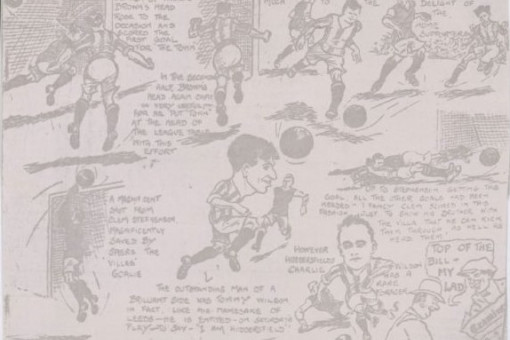Local Businessman Discovers Town Poem from the ‘Glorious Twenties’
 HTSA Admin
HTSA Admin
HTSA Admin

Running a heritage project is fraught with risk.
As soon as people find out what you’re doing, they assume that you live cheek by jowl with matchday programmes, old telegrams, and the disembodied head of Tilly the Terrier. In some cases, this leads to a perfectly well meaning offer to transfer the entire contents of their loft to your living room, or bedroom, or any room, really.
On the whole, though, it’s an interesting and rewarding endeavour.
And so it was this week, when local businessman Andrew Mear contacted us about a Huddersfield Town-themed poem he'd come across while researching the Highfields building on New North Road.
The Grade II listed building opened its doors as a boy’s grammar school in 1839, before becoming Huddersfield College seventy years later. More recently, it belonged to Huddersfield Technical College and Kirklees College, and is currently in the process of being turned into 33 luxury apartments.
According to Mr. Mear, the poem was broadcast sometime in 1924 by the college’s radio society:
“Our Footer team’s a perfect dream / Applaud it heart and soul!
Away with the “blues,” / Well never loose while “Sticky” keeps the goal.
The backs are Pratt, who’s growing fat / And “Moye’s” a ripping sport.
And side by side when sorely tried / They hold the giddy fort.
The forwards shoot with firm strong boot / What splendid chaps they are!
When Smithy plays, in great amaze / We look on from afar.”
Not quite Smile Awhile, then.
We have no idea as to the identities of “Sticky”, “Pratt”, and “Moye”, whose names are absent from the annals of Huddersfield Town A.F.C. Perhaps these were popular monikers for the likes of goalkeeper Ted Taylor, defender Roy Goodall, and midfielder Joe Walter. Or perhaps not.
As for “Smithy”, three players from the 1923/24 and 1924/25 squads bore the name—Albert, Norman, and Billy. It was likely the latter of whom fans sang the praises. By 1924, Billy Smith had already been at the club for a decade, during which time he scored the penalty that won the 1922 F.A. Cup Final.
Do you know anything about the poem and to whom it might refer? Let us know by emailing heritage[at]htsa-web.com.
